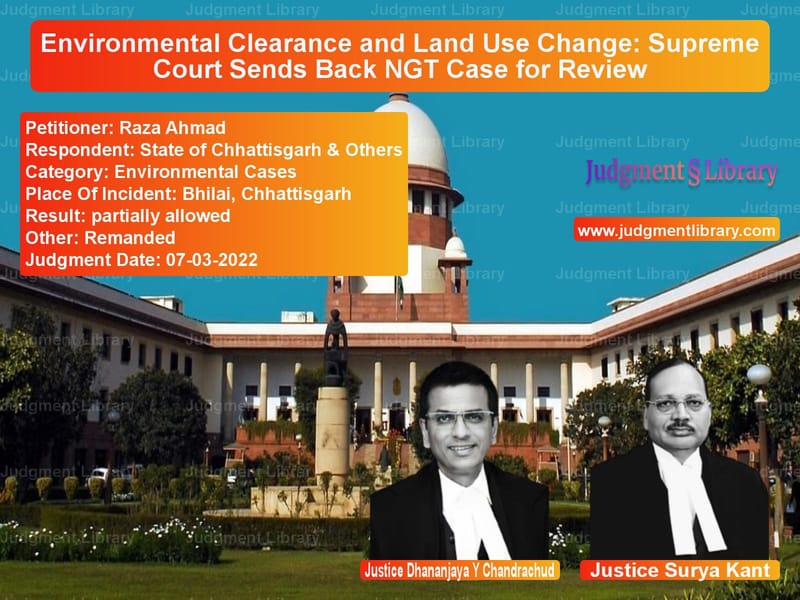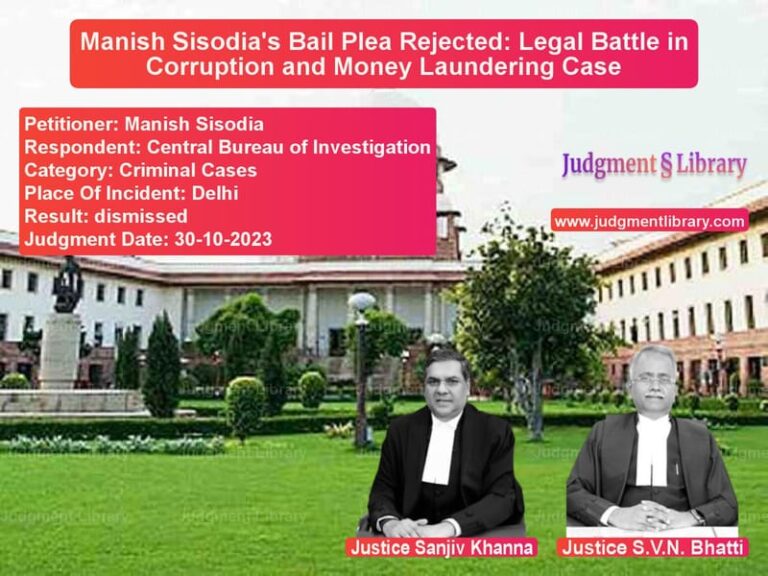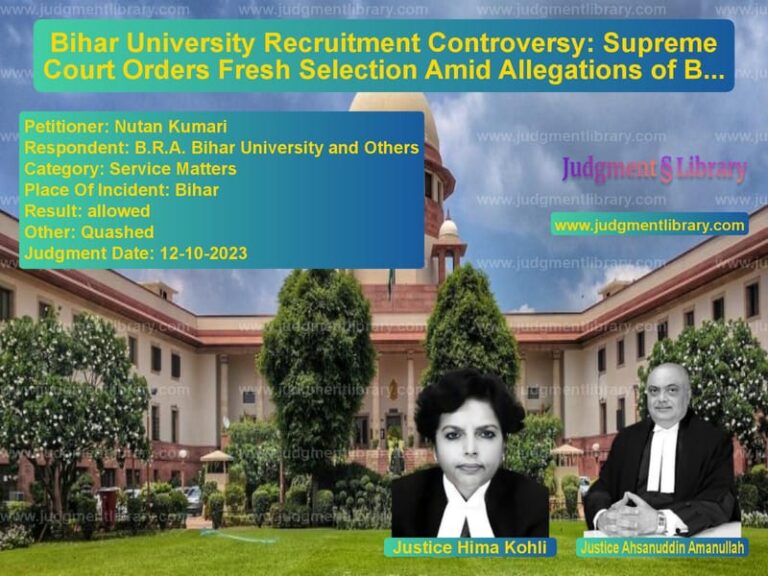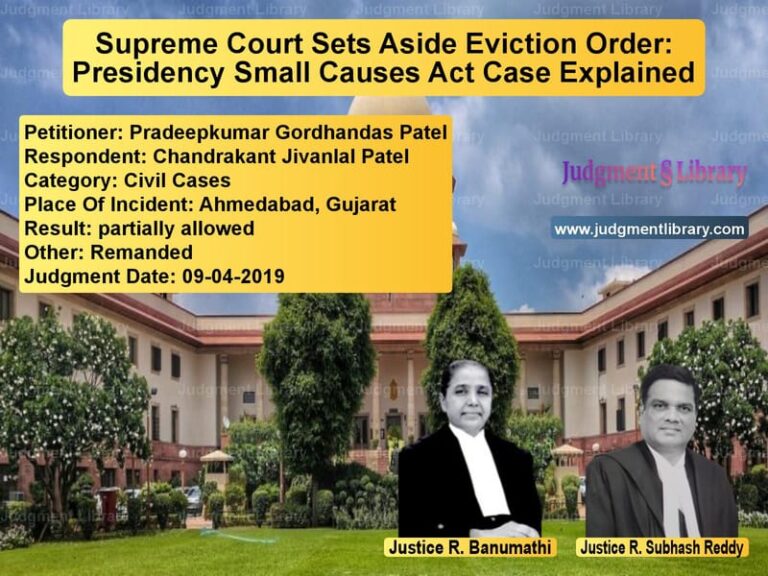Environmental Clearance and Land Use Change: Supreme Court Sends Back NGT Case for Review
The case of Raza Ahmad vs. State of Chhattisgarh & Others revolves around the challenge to an Environmental Clearance (EC) and a land use change notification that allowed the conversion of green belt land into an industrial area. The Supreme Court ruled on whether the National Green Tribunal (NGT) had jurisdiction to hear the challenge and whether the case was barred by limitation.
This judgment is significant as it clarifies the jurisdiction of the NGT, the role of environmental clearances, and the legal procedures required for changing land use from a green belt to industrial purposes.
Background of the Case
The dispute pertains to land in Bhilai, District Durg, Chhattisgarh, where Bhilai Jaypee Cement Limited was granted permission to set up a cement grinding unit. The key events in the case are as follows:
- 2007: Steel Authority of India (SAIL) and Jayprakash Associates entered into an agreement to establish a cement unit in Bhilai.
- May 1, 2008: The Ministry of Environment and Forests granted an Environmental Clearance (EC) for the project.
- February 3, 2011: The State of Chhattisgarh issued a notification modifying the land use of 34.59 acres from “green belt” to “industrial purpose.”
- September 8, 2011: The petitioner filed a Public Interest Litigation (PIL) in the Chhattisgarh High Court challenging the EC and land use change.
- January 28, 2013: The High Court transferred the case to the National Green Tribunal (NGT).
- August 2, 2013: The NGT dismissed the case, stating that it lacked jurisdiction to hear the challenge to the land use change.
- March 7, 2022: The Supreme Court ruled on the appeal against the NGT’s decision.
The petitioner argued that the environmental clearance was wrongly granted and that the change of land use violated environmental laws.
Legal Issues Considered
- Whether the NGT had jurisdiction to hear challenges related to land use change.
- Whether the case was barred by limitation under the NGT Act.
- Whether the environmental clearance was granted in violation of environmental laws.
Petitioner’s Arguments (Raza Ahmad)
- The land use change from “green belt” to “industrial purpose” violated environmental laws.
- The Environmental Clearance (EC) was wrongly issued because the project should have been classified as Category A, requiring a public hearing and an Environmental Impact Assessment (EIA).
- The change of land use violated the conditions of the EC, which required the maintenance of a 33% green belt.
- The High Court wrongly transferred the PIL to the NGT, instead of hearing the case itself.
Respondent’s Arguments (State of Chhattisgarh & Bhilai Jaypee Cement Limited)
- The NGT was correct in ruling that it had no jurisdiction over town planning laws.
- The challenge to the EC was barred by limitation since it was issued in 2008 and was not challenged within the required time.
- The land use change was made in accordance with the Chhattisgarh Nagar Tatha Gram Nivesh Adhiniyam, 1973.
Supreme Court’s Judgment
The Supreme Court bench, comprising Justices Dr. Dhananjaya Y. Chandrachud and Surya Kant, ruled that the NGT was correct in holding that the challenge to the Environmental Clearance was time-barred but directed the NGT to reconsider the issue of land use change.
1. Challenge to Environmental Clearance Barred by Limitation
“The challenge to the EC dated 1 May 2008 is barred by limitation.”
The Court held that since the EC was issued in 2008 and the challenge was filed in 2011, it was beyond the limitation period.
2. NGT Has Limited Jurisdiction Over Land Use Change
“The NGT does not have jurisdiction to entertain a challenge to the notification dated 3 February 2011 of the State government altering the land use.”
However, the Supreme Court noted that if the land use change violated the EC conditions, the NGT might have jurisdiction.
3. Case Remanded for Review
“The proceedings are remitted back to the NGT for determining whether the challenge to the proposed modification of the land use to industrial purpose can be entertained.”
The Court directed the NGT to determine whether the land use change violated the EC conditions.
Key Takeaways from the Judgment
- The Supreme Court reaffirmed that environmental clearance challenges must be filed within the limitation period.
- The NGT has limited jurisdiction over land use planning but may intervene if a land use change violates EC conditions.
- The ruling clarifies that environmental conditions must be followed when land use is modified.
Implications of the Verdict
This ruling has significant implications for environmental law and urban planning:
- Land use changes must comply with environmental conditions.
- Challenges to environmental clearances must be filed within the statutory time limit.
- The judgment strengthens judicial oversight of environmental decisions.
Overall, this Supreme Court ruling ensures that environmental laws are followed while balancing the need for industrial development.
Petitioner Name: Raza Ahmad.Respondent Name: State of Chhattisgarh & Others.Judgment By: Justice Dhananjaya Y Chandrachud, Justice Surya Kant.Place Of Incident: Bhilai, Chhattisgarh.Judgment Date: 07-03-2022.
Don’t miss out on the full details! Download the complete judgment in PDF format below and gain valuable insights instantly!
Download Judgment: raza-ahmad-vs-state-of-chhattisgar-supreme-court-of-india-judgment-dated-07-03-2022.pdf
Directly Download Judgment: Directly download this Judgment
See all petitions in Environmental Cases
See all petitions in Public Interest Litigation
See all petitions in Judgment by Dhananjaya Y Chandrachud
See all petitions in Judgment by Surya Kant
See all petitions in partially allowed
See all petitions in Remanded
See all petitions in supreme court of India judgments March 2022
See all petitions in 2022 judgments
See all posts in Environmental Cases Category
See all allowed petitions in Environmental Cases Category
See all Dismissed petitions in Environmental Cases Category
See all partially allowed petitions in Environmental Cases Category







